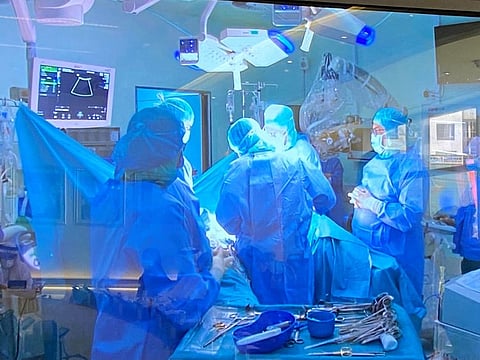Doctors in Dubai achieve a rare feat, conduct surgery on 25-week foetus
Surgeons at Latifa Hospital save foetus, bring smiles to the mother

Dubai: They said ‘if there is a will there is a way’. In a pioneering surgery, a multidisciplinary team of 20 medical professionals of Latifa Hospital conducted an intrauterine surgery on a 25-week male foetus to correct Spina Bifida (a defect in the spinal cord). The first-ever intrauterine surgery in the UAE and the Arab world was conducted in the first week of November.
Dr Mohammad Olama, paediatric and functional neurosurgeon from Rashid Hospital, who was part of the team, told Gulf News: “Internationally too, since 1995, only 250 such surgeries have been carried out.”
The extremely delicate six-hour surgery was performed on the foetus that was diagnosed with myelomeningocoele — a type of spina bifida. The foetus weighed only 700gm. The expert team carried out the surgery, maintaining highest standards of hygiene and sanitisation in line with the protocols for COVID-19.
What is Spina Bifida?
According to Mona Abdul Razzak Al Tahlak, consultant obstetrician and gynaecologist and CEO of the hospital: “Spina Bifida is a congenital neural tube defect that occurs in the first month of pregnancy when the spinal cord does not develop or close properly, leaving open a bundle of nerves of the spinal cord in a sac on the patient’s back. One of the most common causes of Spina Bifida is a deficiency of Folic acid in the mother. These exposed nerves can seriously affect the mobility of the child, disrupt bladder functions and normal healing capacity of the body as well as cause hydrocephaly (filling up of the cerebrospinal fluid in the brain), which requires a brain shunt surgery later.
The defect was picked up in young Emirati mother FA — who already had two healthy children and was in the third trimester of her third pregnancy — during an ultrasound test in the 24th week of her pregnancy. A foetal MRI confirmed the position and location of the spinal lesion, she added.
Elaborate preparation
Discussing the logistics of the critical surgery, Dr Al Tahlak, said: “In a complicated surgery like this, there is extensive counselling of parents and feasibility assessments are carried out. The level and position of the spinal lesion has to be determined, the mother should have had no previous uterine scars and must have undergone full-term previous deliveries. We apprised the parents of both the risks and the benefits. In this case, both the parents were onboard and post-surgery the mother is doing well as she will deliver in the 34th week.“
Timely intervention
Dr Olama added: “The surgery was carried out in the 25th week, leaving the potential for the spine to develop for the next ten weeks. The surgery will enable the foetus to move in the womb and therefore, increase its chances of gaining substantial mobility in the limbs. This will reduce chances of lack of limb mobility normally seen in these cases.“
The team of surgeons also included top US surgeons Dr Samer AlBaba, a paediatric neurosurgeon, and Dr Cole Douglas Greves, maternal and foetal medicine specialist.
Humaid Al Qutami, director general of DHA, congratulated the Latifa Hospital team for the medical feat, saying such pioneering work was in line with the vision of the wise rulers of the UAE who envisaged excellence in health care and looked to provide the best medical care to the community.
Sign up for the Daily Briefing
Get the latest news and updates straight to your inbox






